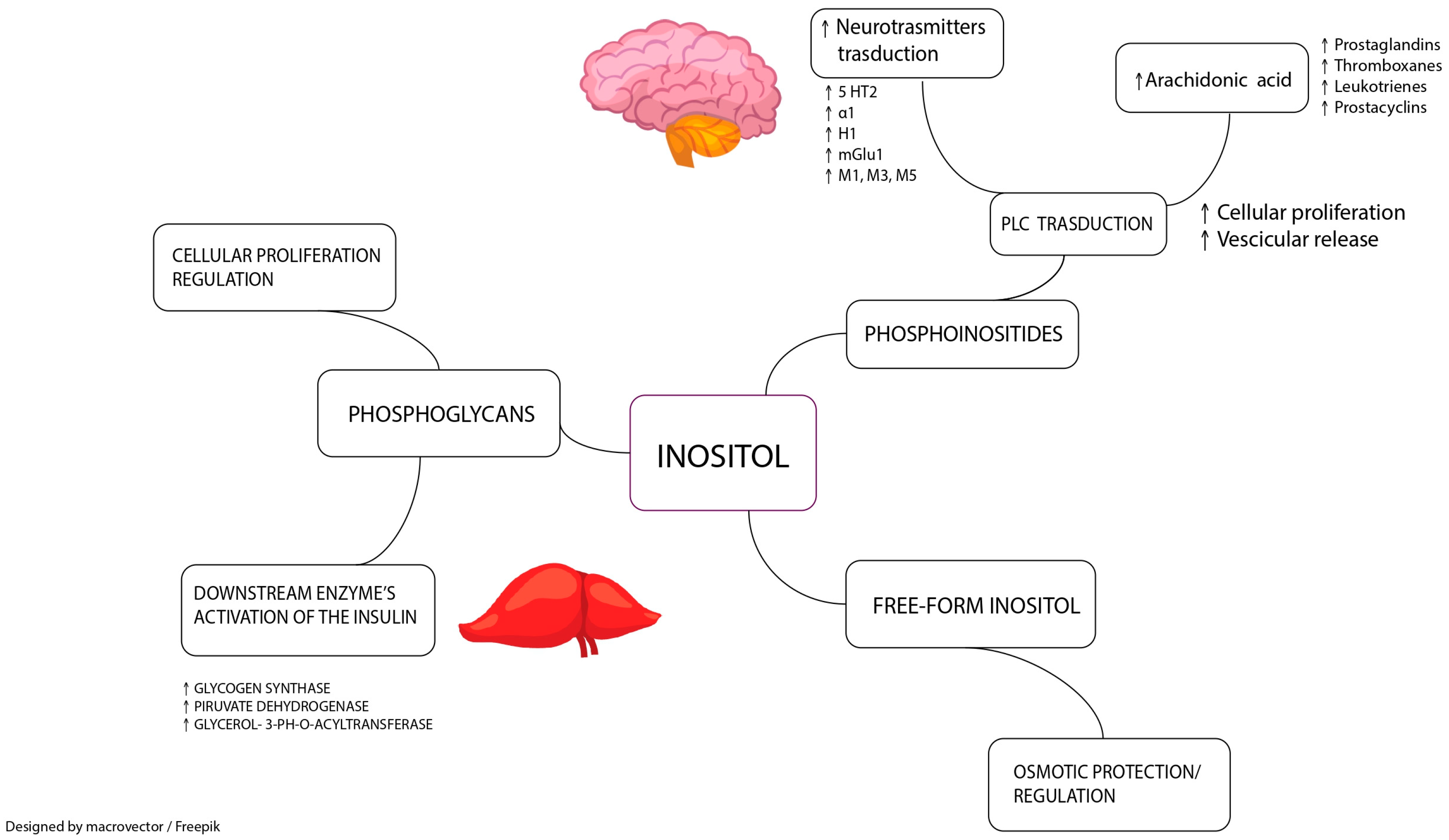Does inositol reduce belly fat?
Inositol improves insulin sensitivity by enabling the body to utilize blood glucose (blood sugar) more effectively, which is one of the critical mechanisms in how it aids in weight loss. Although often overlooked, inositol is a pseudovitamin (not technically a vitamin but a compound beneficial for nutrient intake) that plays a significant role in managing metabolic health and hormonal balance, making it a valuable ally in weight loss.
What is Inositol?
Inositol is sometimes referred to as vitamin B8, but this is a misnomer as it’s not really a vitamin at all. It’s actually a natural sugar made by your body and found in some foods. Your body uses inositol to make the membranes of your cells, create neurotransmitters like serotonin, and to help regulate your insulin levels.
Inositol for Weight Loss: Understanding the Basics
The main way in which inositol promotes weight loss is by improving the body's use of fats and carbohydrates. It helps break down fats in the liver, preventing fat accumulation, which can lead to weight gain. When combined with a healthy diet, it's been found to promote greater weight and fat loss1.
Inositol promotes insulin sensitivity and affects carbohydrate metabolism and mood regulation. In fact, research suggests3 that it works as well as metformin, a commonly used drug for treating insulin resistance.
It can also help manage your appetite and reduce cravings and overeating, making it easier to maintain a caloric deficit necessary for fat loss.
Insulin Resistance
Think of inositol as a key facilitator of communication between your cells, ensuring that messages within your body are delivered efficiently and effectively. When you eat, your pancreas releases the hormone insulin to escort glucose out of your blood and into your cells to be used for energy.
Insulin resistance occurs when your cells do not respond efficiently to insulin, making them unable to bring glucose in for energy. The result is elevated blood sugar.
How Inositol Works to Support Fat Loss and Hormones
Inositol has several mechanisms of action, including those that help to reduce body weight and keep hormones — such as stress, sex, and appetite hormones — balanced. Below are some of the benefits of inositol for weight loss works.
May Promote Fat Metabolism
Inositol encourages the breakdown of fats and may aid in reducing fat accumulation in the liver and other parts of the body.
In one study looking at the effects of myoinositol on those with gestational diabetes, it was found to be effective at raising adiponectin and decreasing insulin resistance. Adiponectin is a hormone that contributes to insulin sensitivity and fat metabolism.

Potentially Enhances Insulin Sensitivity
According to one meta-analysis, inositol supplementation can decrease body mass indexes (BMI) among people with obesity. This study reviewed several randomized control trials and found that 2 grams twice daily of myo-inositol was the best form and dosage for weight loss.
Additionally, weight loss was most pronounced for those who were overweight, obese, or diagnosed with polycystic ovarian syndrome (PCOS).
One of the primary ways inositol aids in weight loss is by improving insulin sensitivity. Insulin resistance is a common issue in conditions like PCOS (which affects up to one in ten women in the U.S. of childbearing age) and can lead to weight gain.
Inositol works to optimize insulin signaling, thereby helping in the regulation of blood sugar levels and reducing the likelihood of insulin-related weight gain.
Takeaway: 2 grams daily of myo-inositol may aid in maintaining a healthy body composition when used along with diet and lifestyle changes.

Supports Cellular Health
Inositol is part of the structural basis for a variety of secondary messengers in our cells. This means it's involved in numerous cellular functions, from gene expression to cell growth, making it a cornerstone of overall cellular, metabolic, and reproductive health.
For example, inositol helps facilitate signals from hormones such as insulin and follicle-stimulating hormone (FSH) from the exterior to the interior of cells, helping to improve the responsiveness of cells.Another example is how myo-inositol plays a significant role in the signaling pathways of follicle-stimulating hormone (FSH) and luteinizing hormone (LH), stimulating the growth of eggs in the ovaries, kickstarting the menstrual cycle and triggering ovulation.
May Help With Mood Regulation
Serotonin, often dubbed the “feel-good” hormone, is made in part by inositol. Considering that serotonin helps you to feel calm and content, adequate levels of inositol can support mood stabilization and may be beneficial in managing conditions like depression, OCD, panic attacks, and anxiety.
If you've ever felt more hungry during your period or noticed significant sugar cravings, that can be the result of serotonin levels dipping. By supporting healthy serotonin production, inositol may indirectly help reduce cravings.
One study also found that inositol has sleep-enhancing effects. Among pregnant women, myo-inositol supplementation improved both sleep quality and sleep duration. Inositol is safe to use in pregnancy, which is why you will find it in many prenatal supplements, including our Prenatal Plus.

Supports Fertility and Hormonal Balance (Including for PCOS)
For women, especially those grappling with PCOS, inositol could aid in regulating menstrual cycles and improve ovarian function. Lowering insulin can be beneficial for enhancing egg health and possibly increasing the chance of ovulation, making it a beacon of hope for those struggling with fertility issues.
Findings from one study found that among lean women with PCOS, inositol reduced circulating insulin, decreased serum androgens, and decreased metabolic abnormalities, including increased blood pressure and high blood sugar.
Properly balanced hormones like estrogen, progesterone, and thyroid hormones can help indirectly support weight loss efforts. Maintaining a healthy weight can further support fertility, as obesity (which can occur with PCOS) is linked to a decline in reproductive health.
While not directly related to weight loss, aside from women with PCOS, inositol may help those undergoing in vitro fertilization (IVF), although more research is needed to demonstrate its effectiveness. Studies have found that when women undergo IVF and have higher MI levels, they experience improvements in pregnancy outcomes due to increased egg quality, enhanced ovulation, and an increased number of retrievable eggs and embryos.
May Help Reduce Inflammation
Chronic inflammation can hinder weight loss as it's linked with hormonal dysregulation, such as increased cortisol levels. Inositol has been shown to possess anti-inflammatory properties, which can be beneficial in creating a healthier metabolic environment conducive to weight loss.
In addition, when inflammation is elevated, the cells become more resistant to hormonal signals, including insulin.

How to Use Inositol to Lose Weight and Maintain Hormonal Balance
While you can obtain some inositol naturally from foods like fruits, whole grains, and nuts, you likely won't be able to eat enough to have significant effects on your weight or fertility. This is where inositol supplements come in handy — such as my formula called Myo inositol Plus — as they help to boost your intake enough to potentially make a difference in your hormones and cellular health.
How Much Inositol to Take
The amount of inositol you should take depends on the reason you're taking it, such as for fertility support, weight loss, thyroid help, or mood enhancement. The most common dose of inositol for weight loss is 1,000-2,000 mg per day.
The typical recommendation for inositol supplementation for PCOS or fertility ranges from 2,000 to 4,000 mg of MI plus 50-100 mcg of DCI each day.
For help with general well-being, weight management, and sleep, I suggest a dose of about 2,000 mg a day, which is known to be well-tolerated and generally effective.
| Use | How Much Inositol |
| Weight Loss | 1,000 mg twice daily |
| PCOS | 2,000-4,000 mg daily |
| Sleep | 1,000 mg once to twice daily |
| Thyroid Support | 2,000 mg daily |
Note that these dosages are carefully calibrated to mirror the natural ratio of inositol found in your body (your body makes much more MI than DCI, with a ratio of our 40:1 MI to DCI). Particularly with d-chiro-inositol, more isn't always better, so stick to a dosage of about 50 to 100 mg/day, the amount that has been shown to be supportive.

Conclusion
Inositol can be a valuable supplement for weight loss, especially for those dealing with PCOS, thyroid issues, or perimenopause, which can all lead to weight gain. It has the ability to enhance insulin sensitivity and regulate blood sugar levels, which are crucial factors in managing weight, and aids in balancing key hormones that influence metabolism, appetite, and fat storage.
By improving hormonal balance and metabolic functions, inositol can help address issues like cravings and overeating, contributing to a healthier weight management process. For the best results, use inositol for weight loss as part of a broader approach that includes diet, exercise, and overall lifestyle modifications.
References
- https://pubmed.ncbi.nlm.nih.gov/30915778/ ↩︎
- https://pubmed.ncbi.nlm.nih.gov/30614282/ ↩︎
- https://pubmed.ncbi.nlm.nih.gov/30614282/ ↩︎
- https://www.ncbi.nlm.nih.gov/pmc/articles/PMC8896029/ ↩︎
- https://pubmed.ncbi.nlm.nih.gov/21414183 ↩︎
- https://www.ncbi.nlm.nih.gov/pmc/articles/PMC8066826 ↩︎
- https://www.ncbi.nlm.nih.gov/pmc/articles/PMC9159559/ ↩︎
- https://www.ncbi.nlm.nih.gov/pmc/articles/PMC5097808/ ↩︎
- https://reproductive-health-journal.biomedcentral.com/articles/10.1186/s12978-021-01073-3 ↩︎
- https://pubmed.ncbi.nlm.nih.gov/29980312/ ↩︎




